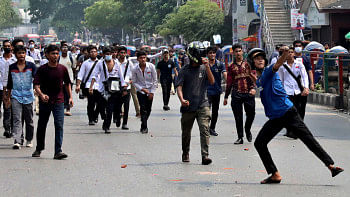Sex workers persecuted as laws lack clarity

As there are no specific provisions about the legality of prostitution in the country's constitution and laws, the sex workers' rights are being violated at the hands of law enforcement agencies and vested interest groups, speakers said at a roundtable yesterday.
Though Article 18 (2) of the constitution stipulates that the "state shall take effective preventive measures against prostitution and gambling", an adult person has the option to declare his or her entry into the profession before a magistrate, they said.
"Nowhere in the constitution is the profession declared illegal directly," explained Tawhida Khandaker, director of Bangladesh National Woman Lawyers Association (BNWLA).
Activists from different NGOs took part in the discussion, "Existing Laws and Policies Relating to Sex Workers in Bangladesh", at The Daily Star Centre, organised by CARE Bangladesh's Solidarity & Empowerment through Education, Motivation and Awareness (SEEMA) project.
The keynote paper, presented by CARE official Rawnak Jahan, mentioned that Section 290 of the Penal Code puts sex work under public nuisance category, which is a punishable act, while the Dhaka Metropolitan Police (DMP) Ordinance 1976 explains the nuisance as an attempt by anyone to attract attention in any public place, or soliciting or molesting anyone for the purpose of prostitution.
Speakers said that because of the ordinance, law enforcers could take action against floating sex workers but not against those living in brothels.
The recent eviction at the 200-year-old Kandapara brothel in Tangail, where around 1,500 sex workers, of whom 937 were registered, lived came up in the discussion.
Speakers said that though a High Court judgement in 2000 termed such action as unconstitutional and illegal and recognised sex workers' rights to state protection, the verdict was not implemented.
Abu Obaidur Rahman, senior deputy director of Ain o Salish Kendra (ASK), said the main target of their eviction was to grab the land of the brothels. It is difficult to rehabilitate the sex workers once they are evicted, he added.
Md Ashraf Ali Mojumder, project manager of Mukto Akash Bangladesh, recommended that the HC be requested to clarify Article 18 (2) regarding prostitution.

 For all latest news, follow The Daily Star's Google News channel.
For all latest news, follow The Daily Star's Google News channel. 



Comments